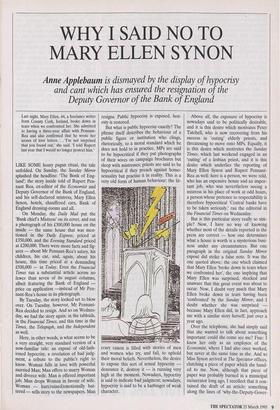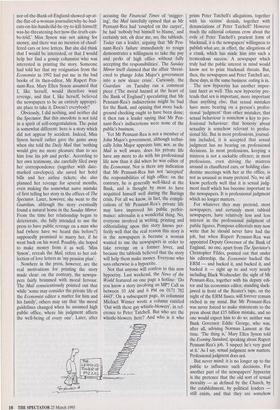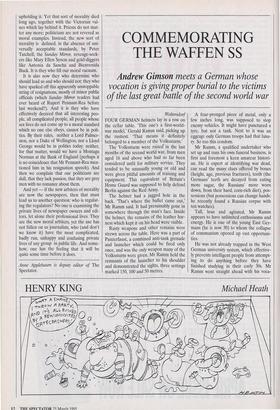WHY I SAID NO TO MARY ELLEN SYNON
Anne Applebaum is dismayed by the display of hypocrisy
and cant which has ensured the resignation of the Deputy Governor of the Bank of England
Last night, Mary Ellen, 44, a freelance writer from County Cork, Ireland, broke down in tears when we confronted her. She admitted to having a three-year affair with Pennant- Rea and also confirmed that he wrote her scores of love letters . . 'I'm not surprised that you found out,' she said. 'I told Rupert last year that I would no longer protect him.'
LIKE SOME hoary pagan ritual, the tale unfolded. On Sunday, the Sunday Mirror splashed the headline: 'The Bonk of Eng- land'; the story inside told of Rupert Pen- nant Rea, ex-editor of the Economist and Deputy Governor of the Bank of England, and his self-declared mistress, Mary Ellen Synon, hotels, chauffered cars, Bank of England dressing-rooms and all.
On Monday, the Daily Mail put the `Bank chief's Mistress' on its cover, and ran a photograph of his £300,000 house on the inside — the same house that was men- tioned in the Daily Express, priced at £350,000, and the Evening Standard priced at £200,000. There were more facts and fig- ures — about Mr Pennant-Rea's salary, his children, his car, and, again, about his house, this time priced at a demanding £500,000 — in Today. Even the Financial Times ran a substantial article across no fewer than seven of its august columns, albeit featuring the Bank of England price on application —instead of Mr Pen- nant-Rea's house in its photograph.
By Tuesday, the story looked set to blow over. On Tuesday, however, Mr Pennant- Rea decided to resign. And so on Wednes- day, we had the story again: in the tabloids, in the Financial Times, and this time in the Times, the Telegraph, and the Independent as well.
Here, in other words, is what seems to be a very straight, very standard version of a now-familiar tale: an exposé of old-fash- ioned hypocrisy, a revelation of bad judg- ment, a tribute to the public's right to know. Woman falls in love with powerful married Man; Man offers to marry Woman and divorce wife. Man is offered important job; Man drops Woman in favour of wife. Woman — hurt/ruined/emotionally bat- tered — sells story to the newspapers. Man resigns. Public hypocrisy is exposed, hon- esty is restored. But what is public hypocrisy exactly? The phrase itself describes the behaviour of a public figure or institution who clings, rhetorically, to a moral standard which he does not hold to in practice. MPs are said to be hypocritical if they put photographs of their wives on campaign brochures but sleep with mistresses; priests are said to be hypocritical if they preach against homo- sexuality but practise it in reality. This is a very old form of human behaviour: the lit- erary canon is filled with stories of men and women who try, and fail, to uphold their moral beliefs. Nevertheless, the desire to expose this sort of sexual hypocrisy denounce it, destroy it — is running very high at the moment. Nowadays, hypocrisy is said to indicate bad judgment; nowadays, hypocrisy is said to be a harbinger of weak character. Above all, the exposure of hypocrisy is nowadays said to be politically desirable, and it is this desire which motivates Peter Tatchell, who is now recovering from his success in 'outing' elderly priests, and threatening to move onto MPs. Equally, it is this desire which motivates the Sunday Times, which last weekend engaged in an `outing' of a lesbian priest, and it is this desire which underlies the reporting of Mary Ellen Synon and Rupert Pennant- Rea as well: here is a person, we were told, who has an expensive house and an impor- tant job, who was nevertheless seeing a mistress in his place of work at odd hours, a person whose pretence to respectability is therefore hypocritical 'Central banks have to be taken seriously,' ran the editorial in the Financial Times on Wednesday.
But is this particular story really so sim- ple? Now, I have no way of knowing whether most of the details reported in the press are correct — how one determines what a house is worth is a mysterious busi- ness under any circumstances. But one paragraph in the original Sunday Mirror exposé did strike a false note. It was the one quoted above: the one which claimed that Mary Ellen 'broke down in tears when we confronted her', the one implying that Mary Ellen was surprised, shocked and unaware that this great event was about to occur. Now, I doubt very much that Mary Ellen broke down in tears having been `confronted' by the Sunday Mirror, and I doubt whether she was surprised because Mary Ellen did, in fact, approach me with a similar story herself, just over a year ago.
Over the telephone, she had simply said that she wanted to talk about something important: could she come see me? Fine: I knew her only as an employee of the Economist, where I had also once worked, but never at the same time as she. And so Miss Synon arrived at The Spectator offices, clutching a piece of paper which she hand- ed to me. Now, although that piece of paper was probably burned in a municipal incinerator long ago, I recollect that it con- tained the draft of an article: something along the lines of 'why-the-Deputy-Gover- nor-of-the-Bank-of-England-showed-up-at- the-flat-of-a-woman-journalist/why-he-had- cuts-on-his-hands/did-he-try-to-kill-himself/ was-he-threatening-her/now-the-truth-can- be-told.' Miss Synon was not asking for money, and there was no mention of chauf- fered cars or love letters. But she did think that I would be interested, or that I would help her find a gossip columnist who was interested in printing the story. Someone had told her that my resignation from the Economist in 1992 had put me in the bad books of its then-editor, Mr Rupert Pen- nant-Rea. Mary Ellen Synon assumed that 1, like herself, would therefore want revenge, and that I, like herself, believed the newspapers to be an entirely appropri- ate place to take it. Doesn't everybody?
Obviously, I did nothing, and neither did the Spectator. But this anecdote is not told in a spirit of self-congratulation. The point is somewhat different: here is a story which did not appear by accident. Indeed, Miss Synon herself rather gave the game away when she told the Daily Mail that 'nothing would give me more pleasure than to see him lose his job and perks'. According to her own testimony, she carefully filed away her correspondence (together with date- marked envelopes), she saved her hotel bills and her airline tickets; she also planned her revenge for several months, even making the somewhat naive mistake of first telling her story in the offices of The Spectator. Later, however, she went to the Guardian, although the story eventually found a natural home in the Sunday Mirror. From the time her relationship began to deteriorate, she fully intended to use the press to have public revenge on a man who had (where have we heard this before?) supposedly promised to marry her, if he went back on his word. Possibly, she hoped to make money from it as well. 'Miss Synon', reveals the Mail, refers to her col- lection of love letters as 'my pension plan'.
Nowhere in the press, however, are the real motivations for printing the story made clear: on the contrary, the newspa- pers fairly brimmed with moral fervour. The Mail conscientiously pointed out that while 'some may consider the private life of the Economist editor a matter for him and his family', others may say that 'the moral guidelines changed when he assumed high public office, where his judgment affects the well-being of every one'. Later, after accusing the Financial Times of 'snigger- ing', the Mail tastefully opined that as Mr Pennant-Rea had 'coupled on the carpet', he had 'nobody but himself to blame,' and certainly not, oh dear me, no, the tabloids. Today ran a leader, arguing that `Mr Pen- nant-Rea's failure immediately to resign demonstrates a willingness to take the pay and perks of high office without fully accepting the responsibilities'. The Sunday Mirror itself claimed that the affair 'threat- ened to plunge John Major's government into a new sleaze crisis'. Curiously, the Guardian on Tuesday ran a comment piece (The moral hazard at the heart of the Bank of England') speculating that Mr Pennant-Rea's indiscretions might be bad for the Bank, and opining that more back- ground checking ought to have been done; it then ran a leader saying that Mr Pen- nant-Rea's indiscretions were none of the public's business.
Yet Mr Pennant-Rea is not a member of John Major's government, although techni- cally John Major appoints him; war, as the Mail is well aware, does his private life have any more to do with his professional life now than it did when he was editor of the Economist. Nor is there any indication that Mr Pennant-Rea has not 'accepted' the responsibilities of high office: on the contrary, he is generally well-liked at the Bank, and is thought by most to have acquitted himself well during the Barings crisis. For all we know, in fact, the compli- cations of Mr Pennant-Rea's private life may have improved his public perfor- mance: adrenalin is a wonderful thing. No, everyone involved in writing, printing and editorialising upon this story knows per- fectly well that the real reason this story is in the newspapers is because a woman wanted to use the newspapers in order to take revenge on a former lover, and because the tabloids believed that the story will help them make money. Everyone who says otherwise is a hypocrite. Not that anyone will confess to this new hypocrisy. Last weekend, the News of the World featured on one page a hotline: `Do you know a story involving an MP? Call us between 10 AM and 6 PM on 0171 782 4443'. On a subsequent page, its columnist Michael Winner wrote a column entitled `Out with these gay whistle-blowers', in ref- erence to Peter Tatchell. But who are the whistle-blowers here? And who is it who prints Peter Tatchell's allegations, together with his victims' denials, together with denunciations of Peter Tatchell? However much the editorial columns crow about the evils of Peter Tatchell's prurient form of blackmail, it is the newspapers' willingness to publish what are, in effect, the allegations of a crank, which has made him into such a tremendous success. A newspaper which truly had the public interest in mind would know not to print blackmail threats. But, then, the newspapers and Peter Tatchell are, these days, in the same business: outing is in.
The new hypocrisy has another impor- tant facet as well. This new hypocrisy pre- tends that sex is important, more important than anything else; that sexual mistakes have more bearing on a person's profes- sional 'judgment' than other mistakes; that sexual behaviour is somehow a key to pro- , fessional behaviour; that honesty about sexuality is somehow relevant to profes- sional life. But in most professions, journal- ism included, it is accepted that sexual judgment has no bearing on professional decisions. In most professions, keeping a mistress is not a sackable offence; in most professions, even driving the mistress around in chauffered cars, or holding clan- destine meetings with her at the office, is not as unusual as many pretend. No, we all know perfectly well that it is sexual judg- ment itself which has become important to the newspapers. It is professional judgment which no longer matters.
For whatever they may pretend, most newspapers, and certainly most tabloid newspapers, have relatively less and less interest in the professional judgment of public figures. Pompous editorials may now write that he should never have had the job, but when Rupert Pennant-Rea was appointed Deputy Governor of the Bank of England, no one, apart from The Spectator's Christopher Fildes, pointed out that under his editorship, the Economist backed the ERM — and backed it, and backed it, and backed it — right up to and very nearly including Black Wednesday: the sight of Mr Pennant-Rea, together with his deputy edi- tor and his economics editor, standing slack- jawed in front of the Reuter's tape, on the night of the ERM fiasco, will forever remain etched in my mind. But Mr Pennant-Rea was never forced to make statements to the press about that £15 billion mistake, and no one would expect him to do so; neither was Bank Governor Eddie George, who was, after all, advising Norman Lamont at the time. 'The thing is,' Mary Ellen Synon told the Evening Standard, speaking about Rupert Pennant-Rea's job, 'I suspect he's very good at it.' As I say, sexual judgment now matters. Professional judgment does not.
But never mind: it is no longer up to the public to influence such decisions, For another part of the newspapers' hypocrisy is the pretence that the old sort of sexual morality — as defined by the Church, by the establishment, by political leaders still exists, and that they are somehow upholding it. Yet that sort of morality died long ago, together with the Victorian val- ues which lay behind it. Priests do not mat- ter any more; politicians are not revered as moral examples. Instead, the new sort of morality is defined, in the absence of uni- versally acceptable standards, by Peter Tatchell, the Sunday Mirror, revenge-seek- ers like Mary Ellen Synon and gold-diggers like Antonia da Sancha and Bienvenida Buck. It is they who fill our moral vacuum.
It is also now they who determine who should lead us and who should not; they who have sparked off this apparently unstoppable string of resignations, mostly of minor public officials (which Sunday Mirror readers had ever heard of Rupert Pennant-Rea before last weekend?). And it is they who have effectively decreed that all interesting peo- ple, all complicated people, all people whose sex lives do not come up to a moral standard which no one else obeys, cannot be in poli- tics. By their rules, neither a Lord Palmer- ston, nor a Duke of Wellington, nor a Lloyd George would be in politics today; neither, for that matter, would we have a Montagu Norman at the Bank of England (perhaps it is no coincidence that Mr Pennant-Rea men- tioned him in his resignation speech). And then we complain that our politicians are dull, that they lack passion, that they are grey men with no romance about them.
And yet — if the new arbiters of morality are now the newspapers, then that must lead us to another question: who is regulat- ing the regulators? No one is examining the private lives of newspaper owners and edi- tors, let alone their professional lives. They are the new moral arbiters, yet the axe has not fallen on us journalists, who (and don't we know it) have the most complicated, badly run, unhappy and confusing private lives of any group in public life. And some- how, one has the feeling that it will be quite some time before it does.
Anne Applebaum is deputy editor of The Spectator.




























































 Previous page
Previous page